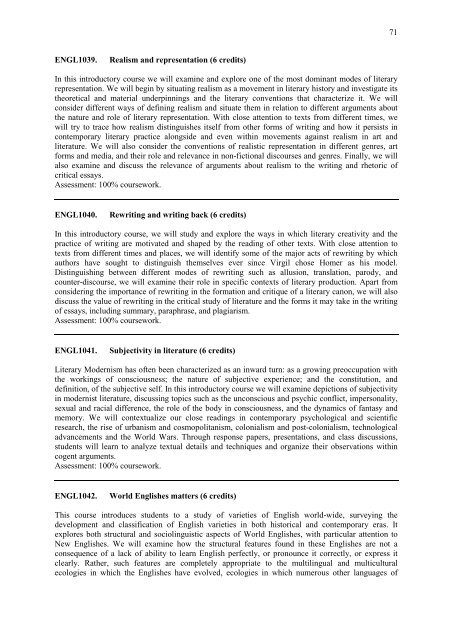(BA) (4-year-programme) - The University of Hong Kong
(BA) (4-year-programme) - The University of Hong Kong
(BA) (4-year-programme) - The University of Hong Kong
Create successful ePaper yourself
Turn your PDF publications into a flip-book with our unique Google optimized e-Paper software.
71ENGL1039.Realism and representation (6 credits)In this introductory course we will examine and explore one <strong>of</strong> the most dominant modes <strong>of</strong> literaryrepresentation. We will begin by situating realism as a movement in literary history and investigate itstheoretical and material underpinnings and the literary conventions that characterize it. We willconsider different ways <strong>of</strong> defining realism and situate them in relation to different arguments aboutthe nature and role <strong>of</strong> literary representation. With close attention to texts from different times, wewill try to trace how realism distinguishes itself from other forms <strong>of</strong> writing and how it persists incontemporary literary practice alongside and even within movements against realism in art andliterature. We will also consider the conventions <strong>of</strong> realistic representation in different genres, artforms and media, and their role and relevance in non-fictional discourses and genres. Finally, we willalso examine and discuss the relevance <strong>of</strong> arguments about realism to the writing and rhetoric <strong>of</strong>critical essays.Assessment: 100% coursework.ENGL1040.Rewriting and writing back (6 credits)In this introductory course, we will study and explore the ways in which literary creativity and thepractice <strong>of</strong> writing are motivated and shaped by the reading <strong>of</strong> other texts. With close attention totexts from different times and places, we will identify some <strong>of</strong> the major acts <strong>of</strong> rewriting by whichauthors have sought to distinguish themselves ever since Virgil chose Homer as his model.Distinguishing between different modes <strong>of</strong> rewriting such as allusion, translation, parody, andcounter-discourse, we will examine their role in specific contexts <strong>of</strong> literary production. Apart fromconsidering the importance <strong>of</strong> rewriting in the formation and critique <strong>of</strong> a literary canon, we will alsodiscuss the value <strong>of</strong> rewriting in the critical study <strong>of</strong> literature and the forms it may take in the writing<strong>of</strong> essays, including summary, paraphrase, and plagiarism.Assessment: 100% coursework.ENGL1041.Subjectivity in literature (6 credits)Literary Modernism has <strong>of</strong>ten been characterized as an inward turn: as a growing preoccupation withthe workings <strong>of</strong> consciousness; the nature <strong>of</strong> subjective experience; and the constitution, anddefinition, <strong>of</strong> the subjective self. In this introductory course we will examine depictions <strong>of</strong> subjectivityin modernist literature, discussing topics such as the unconscious and psychic conflict, impersonality,sexual and racial difference, the role <strong>of</strong> the body in consciousness, and the dynamics <strong>of</strong> fantasy andmemory. We will contextualize our close readings in contemporary psychological and scientificresearch, the rise <strong>of</strong> urbanism and cosmopolitanism, colonialism and post-colonialism, technologicaladvancements and the World Wars. Through response papers, presentations, and class discussions,students will learn to analyze textual details and techniques and organize their observations withincogent arguments.Assessment: 100% coursework.ENGL1042.World Englishes matters (6 credits)This course introduces students to a study <strong>of</strong> varieties <strong>of</strong> English world-wide, surveying thedevelopment and classification <strong>of</strong> English varieties in both historical and contemporary eras. Itexplores both structural and sociolinguistic aspects <strong>of</strong> World Englishes, with particular attention toNew Englishes. We will examine how the structural features found in these Englishes are not aconsequence <strong>of</strong> a lack <strong>of</strong> ability to learn English perfectly, or pronounce it correctly, or express itclearly. Rather, such features are completely appropriate to the multilingual and multiculturalecologies in which the Englishes have evolved, ecologies in which numerous other languages <strong>of</strong>
















